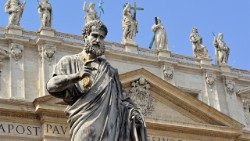Pope at Angelus: Am I free like Christ or imprisoned by worldliness?
By Deborah Castellano Lubov
Are you free, like Jesus was, or imprisoned, by the superficial?
This is the question Pope Francis called on all faithful to ponder at his Angelus address on Sunday in the Vatican, as he urged them to rid themselves of everything weighing them down from approaching God.
The Holy Father drew inspiration from Sunday's Gospel reading, from St Mark, which shows the different reactions to Jesus, after He began His public ministry: His worried relatives feared He had gone mad, while the religious authorities accused Him of acting under the influence of an evil spirit.
On the contrary, the Pope said, Jesus was preaching and healing the sick with the power of the Holy Spirit - the same Spirit that had "made Him divinely free," that is to say, "capable of loving and serving without measure and without conditions."
"Let us pause for a moment," the Pope said, "to contemplate this freedom of Jesus."
First, the Pope said, Jesus was free in relation to wealth, and therefore left the security of His village of Nazareth to embrace a poor and uncertain life. The Lord, he continued, freely healed the sick and anyone who came to ask for His help, "without ever asking for anything in return."
Never hesitated to speak the truth, even when unpopular
Also, the Pope marveled, Christ was free in relation to power.
"While calling many to follow Him," the Holy Father recalled, "He never forced anyone to do so, nor did He ever seek the support of the powerful, but always sided with the least, teaching His disciples to do the same."
Finally, the Pope said, Jesus was free in relation to the pursuit of fame and approval, and for this reason, Christ never hesitated to speak the truth, "even at the cost of not being understood" and of "becoming unpopular," "even to the point of dying on the Cross."
The Lord could never be bought nor corrupted
The Lord never allowed Himself to be "intimidated, bought, or corrupted by anything or anyone," the Pope said.
All this, he argued, shows us that Jesus was a free man, and teaches us a valuable lesson: "If we allow ourselves to be conditioned by the pursuit of pleasure, power, money, or approval," the Pope said, "we become slaves to these things."
But if, on the other hand, "we allow God's gratuitous love to fill and expand our hearts, and if we let it overflow spontaneously," he said, "we grow in freedom and spread its good fragrance around us, in our homes, in our families, and in our communities."
'Am I free?'
Therefore, the Pope invited the faithful to ask themselves, "Am I a free person? Or do I let myself be imprisoned by the myths of money, power, and success, sacrificing my own serenity and peace and that of others? Do I spread, in the environments in which I live and work, fresh air of freedom, sincerity, and spontaneity?"
Pope Francis concluded by invoking the Blessed Mother, asking her to help us live and love as Jesus taught us, in the freedom of the children of God.
Thank you for reading our article. You can keep up-to-date by subscribing to our daily newsletter. Just click here





